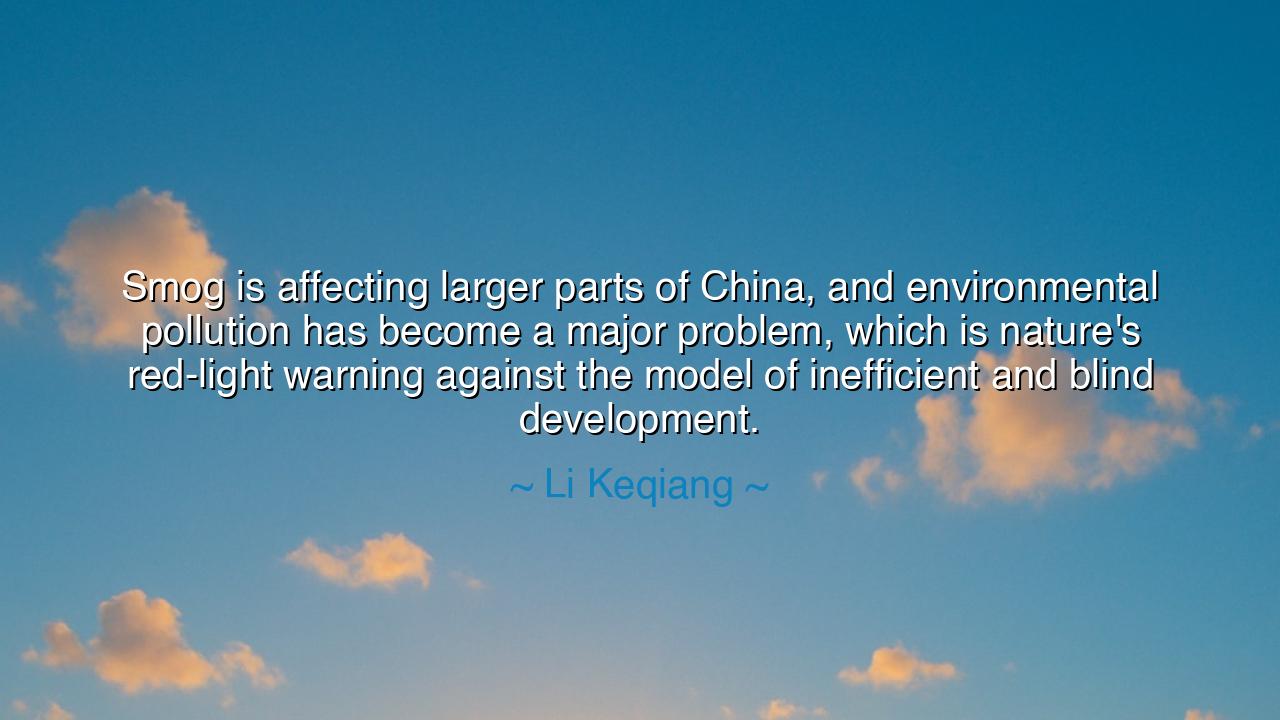
Smog is affecting larger parts of China, and environmental
Smog is affecting larger parts of China, and environmental pollution has become a major problem, which is nature's red-light warning against the model of inefficient and blind development.






The words of Li Keqiang—“Smog is affecting larger parts of China, and environmental pollution has become a major problem, which is nature's red-light warning against the model of inefficient and blind development.”—are not merely a political statement, but a message of ancient gravity and modern urgency. In this declaration, Li does not speak only as a statesman, but as a witness to the wounded spirit of the earth. He recognizes that the gray skies over China are more than just a veil of smoke—they are omens, warnings sent by nature herself. The smog, heavy and unrelenting, is not an accident of progress but a mirror reflecting the hubris of human ambition—a sign that in our haste to build, we have forgotten how to breathe.
From the dawn of civilization, the wise have known that nature speaks, not in words but in consequence. The floods, the droughts, the storms—all were read by our ancestors as messages from the world’s living soul. In Li Keqiang’s metaphor, the “red-light warning” is the modern echo of these ancient signs. Where once lightning and famine reminded kings of their arrogance, today it is the smog and the poisoned rivers that deliver the same divine admonition. His words stand as both confession and prophecy: a confession of humanity’s blindness, and a prophecy of what awaits if the blindness persists.
China’s story is one of monumental transformation—a civilization that rose from poverty to power within a few generations. Yet such speed, though awe-inspiring, carries its shadow. Factories roared, cities expanded, and rivers darkened. Inefficient and blind development, as Li calls it, is not merely a technical flaw but a spiritual one: the belief that wealth alone defines progress, that a shining skyline can replace clean air. The smog that blankets the nation is not just the byproduct of coal and steel—it is the dust of forgotten balance, the cost of progress pursued without wisdom.
History offers a mirror to this modern lesson. In ancient Mesopotamia, the Sumerians built one of humanity’s first great civilizations, yet their hunger for irrigation drained the rivers and salted their soil. Their cities, once lush, turned to deserts. In the 20th century, the Aral Sea, once the fourth-largest lake in the world, was devoured by greed for cotton, leaving behind a wasteland of salt and death. In every age, when man ignores the harmony between creation and consumption, nature sends her warnings—not out of vengeance, but as a plea for restraint. Li Keqiang’s words are thus part of this eternal chorus: that unsustainable ambition is self-destruction in disguise.
The phrase “red-light warning” is striking in its simplicity. A red light commands us to stop, to pause before danger. It is not the end of the journey, but the moment of awakening. Li’s metaphor invites reflection: the warning is not doom—it is opportunity. If humanity heeds it, the same hands that polluted the sky can cleanse it. The same technologies that devoured the earth can be turned to healing it. In this, his message carries hope: that even in the midst of smog, there remains the possibility of renewal through wisdom.
To act on this warning, one must return to the ancient principle of balance. Progress must walk hand in hand with preservation; profit must serve the planet, not exploit it. The philosopher Lao Tzu taught that “the world is sacred; it cannot be improved.” This was not a call to inaction, but a reminder that every change must honor the natural order. To build without awareness is to build upon sand; to create without conscience is to summon collapse. The true measure of civilization, Li implies, is not how high its towers rise, but how gently its people tread upon the earth.
The lesson of Li Keqiang’s words reaches far beyond China’s borders. Every nation, every city, every individual faces the same choice: to continue in blindness or to awaken to responsibility. Environmental pollution is not confined by geography; the wind carries our mistakes to one another. Therefore, let each person live with the awareness that every act—every light switched on, every meal consumed, every journey taken—shapes the fate of our shared home.
And so, the wisdom of this quote is both a warning and a vow. It tells us that nature’s patience is not infinite, and that the smog above us is not the sky’s curse but its cry. Yet it also reminds us that we possess the power to change course. The red light still glows, urging us to stop before we cross the threshold of ruin. If we heed it—if we learn to see development not as domination, but as stewardship—then perhaps one day, the skies will clear, and the children of the earth will breathe freely again, under the blue heavens that their ancestors once revered.






AAdministratorAdministrator
Welcome, honored guests. Please leave a comment, we will respond soon